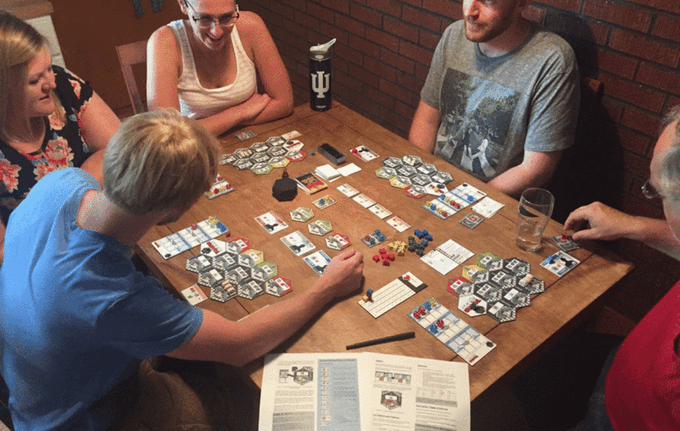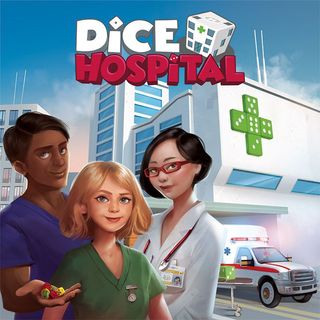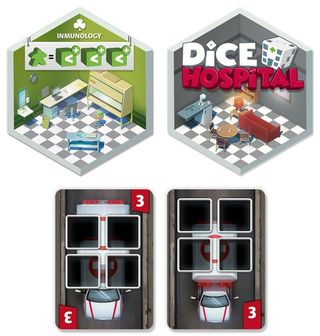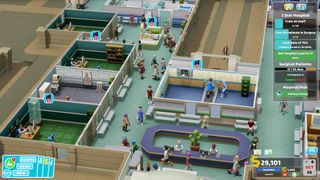If you like Two Point Hospital, you'll love Dice Hospital
Two takes on the classic Theme Hospital give you two quite different, equally fun strategy games.

Two Point Hospital is a glorious resurrection and expansion of 1997's Theme Hospital. Both share the same isometric cartoon graphics and wicked sense of humour. Managing your infirmary with clicks can seem a little clinical, though, for the messy reality of ward work. Should you fancy something a little more tactile and tactical, Alley Cat games has just the thing coming up: Dice Hospital.
It's necessarily rather more abstract than its detailed digital cousin. But the isometric hex art of pharmacies and emergency rooms will feel familiar to fans of Two Point. As will the charming characters on the box and specialist cards. Instead of pixelated patients, though, your charges are actual dice. A bunch get rolled each round and sent in via ambulance. The lower the number, the sicker they are.
Improving their condition is simple at first. You start out with a bunch of three nurses and a basic set of hospital hexes. Placing a nurse in Oncology adds a pip to one yellow dice. Or placing one in intensive care increments a dice showing one or two. But you need to get a dice above six to cure it and score points, and you'll get another ambulance of three dice each turn. That means the limited spaces on your hospital wards fill up very fast.

Untreated dice don't sit idle: they lose a point. So at the start of round two you're already behind the curve, lacking enough staff to treat all your cubic charges. To help you, you get a choice of a new room or specialist each turn. It's far more limited than Two Points' extensive roster of hires, research projects and buildings. But each is better than your initial capabilities, so you still get a satisfying sense of growth and improvement. A Virologist, for example, lets you treat two green dice for a pip each. A radiology hex, meanwhile, lets you can treat a whopping three low-value dice with a single staff member.
After a few rounds of this, the complexity of how best to use staff and rooms to treat patients explodes. There are so many possible combinations that finding the one that treats most dice is hard enough. Yet it's not enough: you've also got to factor in incoming patients and discharging the ones you have for maximum score. If there's no room left, or they languish untreated, your dice will die. Which is sad and all, but worse because they'll give you a score penalty when the game ends.
In Two Point the dead leave ghosts to haunt your hospital instead. But despite the obvious mechanical mismatch, it's surprising how well the experiences line up. It's easy, playing Two Point Hospital, to forget that there's a pause button. But sometimes you remember to click it when the machines are exploding and the toilets are backing up and patients are puking in the corridors. And yet, even with everything frozen, it's easy to go through all the menus and dials and options and miss whatever critical thing is causing your plans to fail.

Pretty much every round of Dice Hospital is like that. Trying to go round all the combos in your head, knowing that a mistake anywhere along the line will throw the whole thing to pieces. Except there are dice, which are somehow more comfortable and familiar than pixels until they die and start clogging up your mortuary. Oh, and things aren't frozen because all the other players are yelling at you to hurry up already.
The biggest gaming news, reviews and hardware deals
Keep up to date with the most important stories and the best deals, as picked by the PC Gamer team.
If you don't want the other players yelling at you, there's even a solitaire mode. In this you just roll patients every turn: you don't get to pick. And you're given eight cards, each with a set of patient colours, that you need to discharge for bonus points, else their value counts against you. The idea is that you try your best and keep a high score. And, trust me, the fact that there are no other players yelling at you doesn't help a lot when it comes to figuring it out.

Comparing Two Point and Dice Hospital is a fantastic showcase of the different design paradigms of PC and tabletop. Because the computer can carry most of the overhead for you, the former has a much richer and more detailed simulation model to explore. To stop the player becoming overloaded, though, much of it gets hidden. The pleasure comes from the ease and breadth of experimentation to find out what works in the plethora of possible situations. That's what strategy gamers have come to expect, more and more, since the release of Theme Hospital.
On the table, by contrast, Dice Hospital lays everything bare. All the players know all the rules. There's no hidden information whatsoever. But with all the guts exposed, there's nowhere to hide. When things go down the tubes, you've got no-one but yourself to blame. The challenge is in taking all that data and making the very best of every situation when you can. Or, at least, making more of it than the other players can manage.
And while Two Point's updated graphics are wonderful, there's an incomparable glee to finding a game full of brightly coloured dice. A mouse click is no substitute for the clack and rattle of them bouncing in the box lid. If you like one, you're almost sure to like the other. And yet both are the source of very different wonders.
Dice Hospital will release on Nov 7th.
Most Popular

